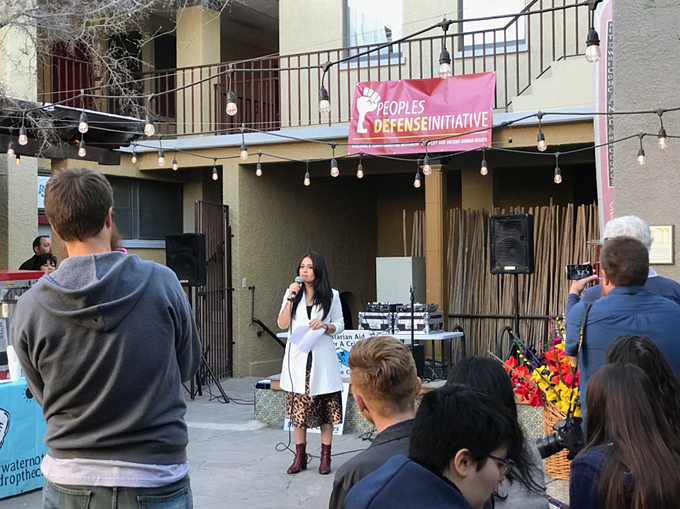When the supporters of a proposed ballot initiative to limit how Tucson police officers can investigate whether someone is in the country legally hosted a kick-off event for their campaign, they invited community members to share their stories of being racially profiled right here in Tucson.
Mel Dominguez, a local artist who hails from Los Angeles, recalled being stopped as a passenger in a vehicle and asked for papers even though she is a U.S. citizen. Rosa Leal, a member of Paisanos Unidos, shared her story of being detained on sight by an immigration officer and held in the Eloy Detention Center, even though she presented a valid Arizona driver's license. She told the crowd it was the Paisanos Unidos organization that helped her understand her rights and maintain confidence while being questioned in detention.
In 2010, Arizona's legislature passed S.B. 1070, which gained national attention for its drastic steps towards enforcement of federal immigration laws. Some of the provisions were eventually struck down by the Supreme Court, but a provision requiring officers to make a "reasonable attempt" of determining the immigration status of a person during a "lawful stop, detention or arrest" was upheld. The law created widespread fear in undocumented communities, since they were required to carry official documentation with them at all times or face prosecution and deportation.
"We'll never get to a place where everybody can thrive in Tucson if we don't first protect people from being jailed and torn apart and thrown away like they're trash because they were born in the wrong place," said Zaira Livier, co-founder of People's Defense Initiative, the political committee behind the proposed Tucson Families Free and Together Ordinance.
PDI and other local organizations believe putting this policy into law would solidify Tucson's stance on immigration, even when city leadership changes in the future. It would also clearly define what the Tucson Police Department can and cannot do.
"They [TPD] have done a really good job of making this an immigrant-friendly city," Livier said. "I have looked at their general orders. They've done a good job but we can do it better, and we can add some teeth to it and we can make it permanent so that they can never change it again without taking it right back to the voters."
If initiative supporters can gather 9,241 valid signatures from city voters by July 5 and persuade Tucson voters to pass it in the November election, Tucson will be known as a "sanctuary city," which has various definitions.
To solidify the meaning of the term, the bill calls for the Tucson Code to be amended to prohibit city law enforcement from detaining people on the basis of their immigration status, assisting in the enforcement of federal immigration laws (except in circumstances expressly required under state and federal law), including certain collaborations between city agencies and federal law enforcement agencies. It also requires certification of visas for immigrant crime victims and "minimum record keeping and protocols" for communications between city employees and federal law enforcement.
Billy Peard, a Tucson-based lawyer with the ACLU who helped write the bill, said the term "sanctuary" is up to interpretation by average voter. He believes that very question is going to be in the public dialogue during the next eight to nine months before the general election.
To give context to the word, Peard and Livier point to the origins of "sanctuary" which begin right here in Tucson. In March of 1982 John Fife, a minister of the Southside Presbyterian Church in Tucson, declared his congregation a public sanctuary for all people. The term started a national movement which has been referred to pejoratively in recent years.
"It reinvigorates the debate, it reinvigorates a remembrance and a memory of our proud local history of what that term was in 1982," Peard said. "That's my long answer. The legal answer is that there is no legal definition of sanctuary. There never has been."
Tucson City Attorney Mike Rankin released a legal analysis of the initiative last Wednesday, Jan. 16. He said the limitations placed on TPD officers would be in direct conflict with SB 1070. He warned that the bill's passage could cause Tucson to lose state-shared revenues and come under scrutiny by the Arizona Attorney General.
Peard said the bill was written with a copy of SB 1070 sitting on the desk, so they were mindful to avoid direct conflict with it. Their intention is to limit the involvement between TPD officers and federal immigration authorities to the maximum extent that the state law allows for.
"We went line by line and we discussed their concerns," Livier told Tucson Weekly of their meetings with city attorneys. "It was really helpful for us, we think we have a solid bill."
She said besides the criticisms that were presented, the two parties were able to clear up a lot of things in the bill's language.
"I respect Mike Rankin and I do believe he spent a lot of time with it and thinking through this carefully," Peard said. "But the law is a complicated thing and lawyers can certainly differ on their interpretations of things and their final conclusions and analysis and that's what happened here."
Since its passage nearly a decade ago, SB 1070 has faced a number of legal challenges. Of the provisions that are still in effect, no state court has given definitive meaning to the law in terms of what it does and does not require of local officers. Peard said because of that uncertainty, Rankin's assessment is guess work, to some extent.
"Some of the provisions are clearly worded, some provisions of SB 1070 are not clearly worded," he said. "So the ordinance proposal is designed to fill in some of those gaps. In my assessment, you can't violate a state law if you're filling in gaps left empty by the state law."
The bill also specifically prohibits immigration investigations from interfering with criminal investigations regarding sexual crimes.
Peard said the reason that provision exists is because law enforcement officers most frequently detect and solve crimes by victims and witnesses voluntarily reporting what they experienced.
"If you're mixing up immigration and criminal investigation functions, fewer victims are going to come forward," he said. "Our position is that this whole proposal, and specifically [this provision], is designed to foster and increase the investigation of crimes and to make our communities safer." Peard said these are precisely the kinds of crimes that are inherently sensitive and vulnerable. They are most likely to be committed by close family and friends, not by strangers. A victim might hesitate to call the police because they don't want to see their loved one deported. The ACLU is frequently involved in legislative efforts on the national and state level. Last year they were involved in a statewide ballot initiative in Oregon which tried to repeal their sanctuary state designation, but voters rejected the measure.
In 2017 the U.S. Department of Justice decided sanctuary jurisdictions will lose access to Byrne Justice Assistance Grants—also known as the largest source of federal criminal justice funds for state, local and tribal authorities—if they prohibit officials from cooperating with federal immigration investigations.
The largest cities in the United States with sanctuary policies are New York, Los Angeles, Chicago, Philadelphia, San Diego, San Francisco and Seattle. Cities in Arizona and Texas, two border states, do not have any sanctuary designations.
State Rep. Kavanagh (R-Fountain Hills) asked Mark Brnovich, the Attorney General, to investigate the Phoenix Police Department and city council last year when they adopted policies that tried to improve the relationship between immigrants and local police officers. He has indicated that he will file another complaint if the Tucson Families Free and Together ordinance passes.
Mayoral candidates in the City of Tucson—including the announced Democrats, Tucson City Council member Regina Romero and former state lawmaker Steve Farley, as well as independent Ed Ackerley—did not respond to requests for comment on the initiative.
Tucson City Council Member Steve Kozachik of Ward 6 said he would be reluctant to support any bill that would roll back the progress TPD has made with their general orders by put the city in the crosshairs of the state Legislature again for another lawsuit that could undo a lot of the progress that the city has already made.
He said he wishes this initiative were taking place somewhere like "Arpaio country, where there's a demonstrable need for it based on police activities."
"My main goal is to protect the progress that we've already made because we know that guys like (state Rep. Mark) Finchem and frankly Brnovich are ready to come after us with guns blazing and it would be sad to see the progress we've made rolled back out of good intentions."
Kozachik added that he is working to find housing for migrants at midtown Benedictine Monastery while a developers seeks a rezoning to add apartment buildings on the property.
"This is something that is really important to me on a personal level," Kozachik said. "Let's be careful of what we ask for. We may wind up regretting it later on when we get sued—not if we get sued, because we will."
Peard said that these concerns are misplaced.
"Since when did we begin legislating out of fear?" Peard asked. "Since when did we let fear of what some outside body will do control and guide our local public policy?"









